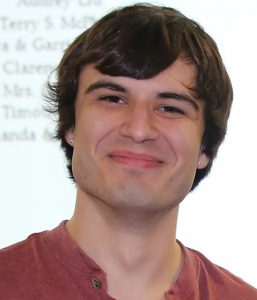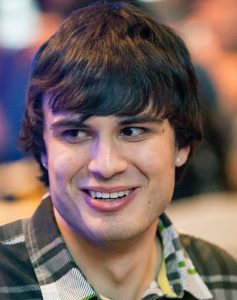 Computer Science alumnus Peter Washington arrived at Rice planning to double major in Political Science and Economics. Then he signed up for an introductory course, COMP 140 taught by Devika Subramanian, because he had some interest in the area and not much coding experience.
Computer Science alumnus Peter Washington arrived at Rice planning to double major in Political Science and Economics. Then he signed up for an introductory course, COMP 140 taught by Devika Subramanian, because he had some interest in the area and not much coding experience.
“All the assignments were presented in the context of real world problems,” he said. “So my introduction to CS was ‘you can use CS to solve problems in a variety of domains,’ even political science and a bunch of other things I never would have imagined programming could be used for. That piqued my interest because I could major in CS and apply it to anything.”
Washington spent his free time engaged in several different activities, including research in two large labs in Rice’s Electrical and Computer Engineering department. He said, “With Lin Zhong, I got into some core system research and it was fun, teaching me the fundamentals of academic research. I also really wanted to explore music projects.
“Lin was happy to advise me on a project idea I had for teaching music theory online, based on the idea that people can tell what sounds good without understanding the music theory behind why it sounds good. So we leveraged that to teach them music theory, and I worked on that project for a year.”
He next worked with Ashu Sabharwal on the Scalable Health Initiative involving a variety of projects that used computer science and engineering to aid in various health problems. In one of Sabharwal’s projects, Washington created a platform for clinical researchers to rapidly iterate changes to mobile apps used by their patients.
“Imagine a patient taking home a mobile device loaded with an app that they would use with their healthcare or treatment program. After several weeks, the clinicians might want to make some changes before launching into formal clinical trials.
“The doctors contact the developer, the changes are made, then they have to go back to the patients and give them instructions to physically update their app. We were able to empower the clinicians to update their app via a website and push out the changes in real-time.”
That was when Washington realized he loved this kind of research and wanted to keep doing it. He said traditional CS research might be focused on optimizing an algorithm or system so that it runs more efficiently, but human-computer interaction research involves building systems for people and monitoring how users interact with the system as well as measuring the outcomes in the users.
 “It was a mix between CS and Psychology,” said Washington. “And I stumbled on it while writing up papers during my Rice research. I had to look at and cite relevant literature, and came across a conference called CHI (for computer human interaction). There were a bunch of papers published in the field, it was an active community, and I wondered what I could do to learn more about it and become a part of that research community.”
“It was a mix between CS and Psychology,” said Washington. “And I stumbled on it while writing up papers during my Rice research. I had to look at and cite relevant literature, and came across a conference called CHI (for computer human interaction). There were a bunch of papers published in the field, it was an active community, and I wondered what I could do to learn more about it and become a part of that research community.”
He decided to pursue an advanced degree and applied to several graduate schools with research groups focused on human-computer interaction. Washington enrolled at Stanford University, completed his Masters in Computer Science, and is now pursuing his Ph.D. in Bioengineering at Stanford. During his Masters, he has worked on a human-computer interaction project developing a wearable aid for children with autism using Google Glass to automatically recognize emotions and provide feedback in real-time.
“Human-computer interaction research can be performed in any department,” said Washington. “At Rice, a few of the Psychology professors are doing it. In other universities you might find it linked to other types of Engineering, Social Sciences, Medicine, or even the life sciences. At Stanford, I saw a professor give a talk in the human-computer interaction seminar about teaching Biology to people without access to wet labs, which are expensive. I’d like making education accessible to everyone, but it’s harder with subjects like biology because of the physical presence requirement.
“So I talked with him and now I work in his lab as his Ph.D. student. We are working on a web platform to interact with single-cell organisms in real-time, to teach users about Biology in a gamified way. The platform can also be used to automate and write scripts for conducting scientific experiments. The work I do is very CS-intensive even though I am in a BioE lab, and I plan to continue publishing at human-computer interaction conferences. The interdisciplinary research skills I learned at Rice CS can be applied to many different fields, even something like art, so I am open to becoming a faculty member in a wide variety of academic departments.”
He also completed a number of traditional industry internships, trying a different company every summer and found it to be a useful comparison. He advises other CS students to try both research and industry. “Rice has a lot of opportunities. There are a lot of professors who would love to have undergraduate students research with them. The appeal of the industry internships is the pay, and once you are there they try to recruit you.
“The summer after your freshman year is a perfect time to do research, and the experience you get doing research will then help you get jobs in industry. When you get to do coding in a real world setting, whether in a lab or in industry, it connects everything in a beautiful way and you see how those things you learned in class can be applied.”
For Washington, the Ph.D. experience combines the best of both research and industry. He compared it to the thrill of working in a startup without the risk of financial failure. “That’s kind of what a Ph.D. is all about. You are in a structured setting and allowed to explore new concepts without the risk.”
But he also discovered the Ph.D. program is a gateway to explore teaching and he still admires his Rice CS professors. He said, “I’d love to teach and research in a college setting. Rixner, Luay, and the rest of the professors who teach the core courses –I think that’s why I chose CS as a major– because their quality of teaching was so high. That’s the kind of person I’d like to be when I grow up.”